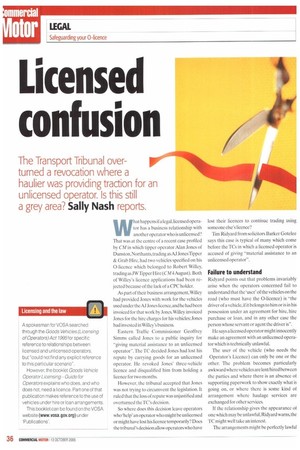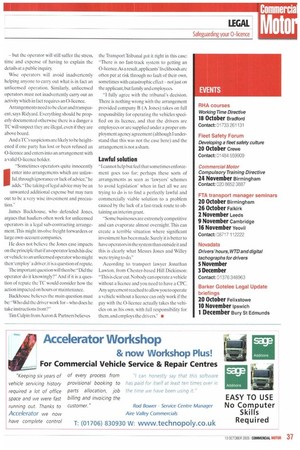Licensed confusion
Page 38

Page 39

If you've noticed an error in this article please click here to report it so we can fix it.
The Transport Tribunal over
turned a revocation where a haulier was providing traction for an unlicensed operator. Is this still a grey area? Sally Nash reports.
What happens if a legallicerised operator has a business relationship with another operator who is unlicensed? That was at the centre of a recent case profiled by CM in which tipper operator Alan Jones of Dunston,Northants, trading as AJ Jones Tipper & Grab Hire. had two vehicles specified on his 0-licence which belonged to Robert Willey, trading as J W Tipper Hire (CM 4 August). Both of Willey's licence applications had been rejected because of the lack of a CPC holder.
As part of their business arrangement,Willey had provided Jones with work for the vehicles used under the AJJones licence,and he had been invoiced for that work by Jones, Willey invoiced Jones for the hire charges for his vehicles; Jones had invested in Willey's business.
Eastern Traffic Commissioner Geoffrey Simms called Jones to a public inquiry for "giving material assistance to an unlicensed operator-. The TC decided Jones had lost his repute by carrying goods for an unlicensed operator. He revoked Jones' three-vehicle licence and disqualified him from holding a licence for two months.
However, the tribunal accepted that Jones was not trying to circumvent the legislation. It ruled that the loss of repute was unjustified and overturned the TC's decision.
So where does this decision leave operators who'help' an operator who might be unlicensed or might have lost his licence temporarily? Does the tribunal's decision allow operators who have lost their licences to continue trading using someone else's licence?
Tim Ridyard from solicitors Barker Gotelee says this case is typical of many which come before the TC.s in which a licensed operator is accused of giving "material assistance to an unlicensed operator".
Failure to understand
Ridyard points out that problems invariably arise when the operators concerned fail to understand that the 'user' of the vehicles on the road (who must have the 0-licence) is -the driver of a vehicle,if it belongs to him or is in his possession under an agreement for hire, hire purchase or loan, and in any other case the person whose servant or agent the driver is".
He says a licensed operator might innocently make an agreement with an unlicensed operator which is technically unlawful.
The user of the vehicle (who needs the Operator's Licence) can only be one or the other. The problem becomes particularly awkward where vehicles are lent/hired between the parties and where there is an absence of supporting paperwork to show exactly what is going on, or where there is some kind of arrangement where haulage services are exchanged for other services.
If the relationship gives the appearance of one which may be unlawful,Ridyard warns, the TC might well take an interest.
The arrangements might be perfectly lawful — but the operator will still suffer the stress, time and expense of having to explain the details at a public inquiry.
Wise operators will avoid inadvertently helping anyone to carry out what is in fact an unlicensed operation. Similarly, unlicensed operators must not inadvertently carry out an activity which in fact requires an 0-licence.
Arrangements need to be clear and transparent, says Ridyard. Everything should be properly documented otherwise there is a danger a TC will suspect they are illegal, even if they are above board.
And a TC's suspicions are likely to be heightened if one party has lost or been refused an 0-licence and enters into an arrangement with a valid 0-licence holder.
"Sometimes operators quite innocently Ienter into arrangements which are unlawful, through ignorance or lack of advice," he adds. "The taking of legal advice may be an unwanted additional expense but may turn out to be a very wise investment and precaution."
James Backhouse, who defended Jones, argues that hauliers often work for unlicensed operators in a legal sub-contracting arrangeme nt. This might involve freight forwarders or large own-account companies.
He does not believe the Jones case impacts on the principle that if an operator lends his disc or vehicle to an unlicensed operator who might then 'employ ' a driver, it is a question of repute.
The important question will then be:"Did the operator do it knowingly?" And if it is a question of repute the TC would consider how the action impacted on hours or maintenance.
Backhouse believes the main question must be: 'Who did the driver work for — who does he take instructions from?"
Tim Culpin from Aaron & Partners believes the Transport Tribunal got it right in this case: "There is no fast-track system to getting an 0-licence.As a result, applicants' livelihoods are often put at risk through no fault of their own, sometimes with catastrophic effect — not just on the applicant, but family and employees.
"I fully agree with the tribunal's decision. There is nothing wrong with the arrangement provided company B (A Jones) takes on full responsibility for operating the vehicles specified on its licence, and that the drivers are employees or are supplied under a proper employment agency agreement (although I understand that this was not the case here) and the arrangement is not a sham.
Lawful solution
"I cannot help but feel that sometimes enforcement goes too far: perhaps these sorts of arrangements as seen as 'lawyers' schemes to avoid legislation' when in fact all we are trying to do is to find a perfectly lawful and commercially viable solution to a problem caused by the lack of a fast-track route to obtaining an interim grant.
"Some businesses are extremely competitive and can evaporate almost overnight. This can create a terrible situation where significant investment has been made. Surely it is better to have operators in the system than outside it and this is clearly what Messrs Jones and Willey were trying to do."
According to transport lawyer Jonathan Lawton, from Chester-based Hill Dickinson: "This is clear cut. Nobody can operate a vehicle without a licence and you need to have a CPC. Any agreement reached to allow you to operate a vehicle without a licence can only work if the guy with the 0-licence actually takes the vehicles on as his own, with full responsibility for them, and employs the drivers." •












































































































































































































